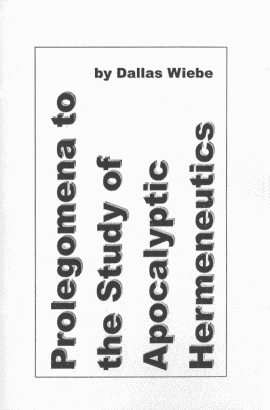 That’s right. A theological prolegomena.
That’s right. A theological prolegomena.
How’s that for blog post title?
When you saw the title, what did you immediately think? Come on, be honest.
If you are like me, you probably rolled your eyes and thought, “What is this guy trying to prove with a title like that?”
And yet as I sit here writing this, I am looking at the first page of three different sets of Seminary class notes, all of which have have this phrase: Theological Prolegomena.
This brings up one of my primary criticisms of theology: What’s the deal with all the big words?
I know that sometimes big words are necessary, but I think that usually, theologians use big words so that we will be impressed by their knowledge, and as a result, will not question them when they later start to say some outlandish things.

The logic seems to go like this:
- I have some crazy things to say.
- I can’t just say them because people will think I’m crazy.
- So I will mask these ideas in big words which nobody understands.
- Then people will think I’m smart and will accept the crazy things I have to say.
I know, I know. I’m oversimplifying and being overcritical. But remember, in this series on blogging through seminary, I get to say the things and ask the questions I never had the courage to say or ask in class.
And as much as I love big words and even understand (most of) them, I always thought they were unnecessary. Why say, “Theological Prolegomena” when you could say, “An Introduction to Theology,” since that is basically what it means? (Literally, Prolegomena means “first words.” Kind of like the introductory section of a book is called the “Prologue.”)
I know, I know. There is a history here. A tradition. It goes back to the Latin and the Greek and the great theologians of the past. Fine. And that is why we need to know the big words today…if we are going to read the old theologians. But if we are writing theology for people today, well, let’s use words that people use today.
It is my conviction that if a theologian doesn’t know the culture and times well enough to speak and write in ways that people understand, then the theologian doesn’t know the first thing about theology.
And what is the first thing about theology? It’s not something you find in most theology books. We’ll look at it tomorrow.
Have you ever tried to read theology? What was your experience? Do you like the big words, or do you get frustrated by them?




In Rick Warren’s recent interview with John Piper, he addressed a similar concern to yours. He basically said that a lot of people link deepness to using big words. Not a super huge fan of Warren, but he had a pretty good point there. He said that he preached a multi-week sermon series on sanctification and never used the word “sanctification.”
This raises a good point. What about big words of the Bible? If Paul used them, why can’t we? Isn’t it up to us to educate people to know and understand the big words that they will encounter in the Bible rather than “dumb it down” to their level?
This is a trick question…. I will have to make a follow-up post about this…. Maybe I can tap one out later today….
What pompous a** theologian wrote that first paragraph (in the comment) that you obviously quoted? (Is that plagiarism? Is it quoted directly from your seminary notes?)
I have a decent vocabulary, but the only word most people ever hear is the word love. (O.K., I admit lots of people’s ears also perk up when they hear the word “money”.) They don’t care what I know (or how many big words I know), they only want to know if I care about them.
I think I’m the pompous ass theologian that wrote that! Ha!
I didn’t plagiarize it from my seminary notes, and when I was a pastor I did actually preach a sermon or two with this line of reasoning in it.
So I take full blame. Although… I know I heard it somewhere else first… I just cannot remember where.
Of course, I strongly disagree with this idea now, and will publish a post about this later today.
Were Paul’s words “big” to the people he was preaching to? That’s an honest question. I think when preaching to Jews in the temple, they would be familiar with the concepts of propitiation or other such big words, so they wouldn’t be daunting to Paul. After all, wasn’t he the one who became as a gentile to the gentiles and as a Jew to the Jews so that he might win many?
That was supposed to be a reply to your comment 🙂
Loren,
Great question. I answer this in the post which I will publish later today, but for now, I don’t think the words were “big words” for Paul or his audience. He wrote in the common, every-day language of the people.
I use them when the need is there to be specific… but I always attempt to immediately explain (in an “appositional grammatical structure” 🙂 ) what it means…. right then and there.
Appositional grammatical structure! Ha ha! I love it.
I hope when you are explaining the big word, you don’t use that phrase!
I can hear it now:
“When Paul speaks of justification — and by way of an appositional grammatical structure — being declared righteous by God — he is telling us that…”
uh… no I don’t, you pompous a$$ theologian… :). Entirely facetious…
I try to even explain them more than that … but along similar lines, I guess. But as someone else pointed out, propitiation, sanctification, justification, etc. weren’t as big of words as we think they were… and I do feel it my duty to introduce, define, and review them for my congregation because they are biblical vocabulary. People today do seem to object to having to learn anything, though.
It seems to me that the big words are of value but only when used with humility and in the right context. Knowing when and where to use them is the trick. I think you’re right that some people try to astound congregations with their big words, trying to show how smart they are…. but, on the other extreme, some congregations don’t realise that the big words encapsulate big concepts and if they were only willing to learn what they mean it actually could make it all a lot simpler and more straight forward. Does that make sense?
Rich, yes, it makes sense, and I agree with you. As with everything in life, there is balance. I love the big words also, but want more than anything to be understood. However, I also want to challenge others to move upward and onward, and sometimes that means using big words.
I’m with you – if the big words help, use them… but if they’re just added in for ego then drop them and the ego!
well put, Rich
thanks
Well, I can’t say I rolled my eyes, but I was hoping for an explanation so that I wouldn’t have to bring up the dictionary. 🙂
I have a little computer time today, trying to catch up on your recent posts. Loving the comments and discussions!
Yeah, communication is the point of language. Finding the appropriate vernacular for each conversation is an art form. There is every extreme, from those interested to learn something new to those who are highly aware of their ineptitude. It has got to be important as followers of Jesus that we avoid making others feel that humiliation so that they can experience His love through us.
I am often amazed at my natural tendency to want to give myself a one up with just a word, and my frequent frustration when I can’t find that big word to do it with! Sick. I just keep asking Him to let His life live through me.
Yes. Of course, Mark Twain was right when he said, “The difference between the right word and the almost-right word is the difference between the lightning and the lightning-bug.” Sometimes, the big word is the only one that will do.
Love that! Gotta tweet it!
Wittgenstein once stated that an entire philosophy could be written with jokes. I wonder if this could be done with theology as well. No large words required, only funny. I personally think writing theology as poetry is another viable option. Haiku would be challenging but the big words like sanctification and justification would comprise the entire first line. Just a thought…
Yes, I enjoy the study and application of theology, but not the big words.
Mick
The big words can have rich meaning, but small words are vital too!
Martin Lloyd Jones once preached an entire sermon on the word “But” in Ephesians 2:4. What a vital word!
I have a lot of friends who went to seminary. I actually was jealous of them. I did not have a full bachelors degree so I could not go to seminary full time, plus it was so expensive. I did take Greek over one summer. Actually it was a years worth of Greek in 9 weeks. I too was working full time and I was wore out when I was done. I always wondered, though, how seminaries who were preparing pastors did not prepare them for real life ministry issues. Knowledge is great but in the end you need to get down in the dirt with people who don’t care what voice or tense a particular verb is. That I do not understand.
Seminary is expensive. I often think about all the books I could have bought had I not gone to seminary… Ha! I am still paying for it.
But you are right, in the end, it boils down to begin able to get down into the dirt with people.
Probably should have put this under the recovering from seminary post.
A bit late to the party, obviously, but I still think that it needs to be said: sometimes the question is not “Should I pick a big word or a small word?” but rather “Should I pick the right word, or just something close?” Sometimes the “right” word is a big word, like prolegomena, sometimes it’s something “smaller”, like introduction.
But in defense of the term prolegomena, sometimes what you are writing is a prolegomenon, and it’s okay to call it that. Other times you’re just writing a standard, run-of-the-mill introduction, and there’s no reason to call it a prolegomenon at all, it would be disingenuous actually.
I say, let’s aim to use the right word, no matter the size. If you think people will have trouble with it, then introduce people to it.